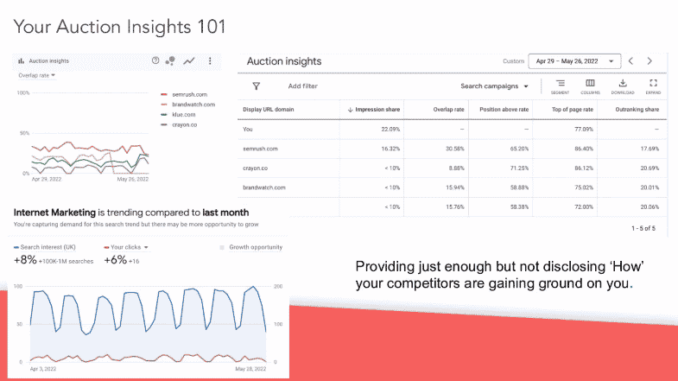
Search marketing channels are experiencing a surge in revenue. Macroeconomic and hiring impacts the world over have led to companies like Google experiencing massive growth, highlighting how search has become a key channel for marketers.
“It’s great for Google, but that means rising costs for us,” said Sean O’Connor, senior CSM and sales engineer at Adthena, in a recent webinar (scroll down to watch the video).
Attribution is one reason why these developments have made it difficult for paid search marketers to succeed in the space.
Google holds more data than ever before but doesn’t always show marketers the full picture when it comes to their campaigns. At the same time, its growth in the search space, and the decline of other marketing avenues, mean growing pressure on paid marketing teams.
“We are going to experience a higher level of scrutiny for Google Ads than we have in the past few years,” O’Connor said. “Search is the first thing you start, and the last thing you stop, when it comes to brand advertising. That isn’t going to change, but it is going to put the microscope over all the activities that we’re doing.”
“We need to have a clear attribution to the success we’re bringing to our businesses,” he added.
Here’s how paid search marketers can better attribute success using Google Ads’ auction insights tool and search intelligence.
Google Ads auction insights
“Auction insights is particularly valuable in providing context on what our competition is doing, but not how they are gaining ground,” O’Connor said. “Impression share and overlapping position rate are somewhat relevant, but they’re not the metrics I particularly care about.”
While many marketers long for the days of “old school” metrics such as average position for individual terms, auction insights still provides useful campaign stats. These include information such as marketing trends, which essentially gives marketers Share of Search data so they can see where they stand.
Source: Sean O’Connor
“It’s not so much about campaign optimization, but rather an insurance policy,” O’Connor said.
To get the most out of auction insights, he recommends the following:
Installation: Build out enhanced dashboards to review campaign data alongside business metrics.Establish a new workflow: Segment campaigns to enable messaging and market share analysis.Take action: Focus on product roadmap development, regional/local segmenting, and spend adjustments.
Get the daily newsletter search marketers rely on.
Processing…Please wait.
SUBSCRIBE
See terms.
function getCookie(cname) {
let name = cname + “=”;
let decodedCookie = decodeURIComponent(document.cookie);
let ca = decodedCookie.split(‘;’);
for(let i = 0; i <ca.length; i++) {
let c = ca[i];
while (c.charAt(0) == ‘ ‘) {
c = c.substring(1);
}
if (c.indexOf(name) == 0) {
return c.substring(name.length, c.length);
}
}
return “”;
}
document.getElementById(‘munchkinCookieInline’).value = getCookie(‘_mkto_trk’);
Search intelligence
“Google is taking information away from the auction insights section, so we need to be able to shed some light behind the curtain,” O’Connor said. “Considering automation policies, do we let it run? How long does it take to learn? How bundled does it need to be?”
“We need to be able to get past this ‘black box,’” he added.
Auction insights give a good amount of campaign information (e.g., impression share, positive above rate, outranking share), but limit your ability to gauge their efforts against competitors in areas they’re not showing up in, according to O’Connor.
This is why he suggests teams craft their own “formula” that combines data gained from auction insights and a search intelligence platform.
“This creates a ‘whole marketing view,’ which [includes] your terms and closely related competitor terms,” he said. “That whole marketing view is going to show your market opportunity.”
Apply the formulas for success
Acquiring and analyzing search data from auction insights and search intelligence tools isn’t enough to improve Google Ads campaigns. Marketers need to activate the combined data to adjust targets and set benchmarks.
“With enough evidence from auction insights and analytics, you can combine them into a nice visualization that can justify your job and make it easier,” he said.
However, marketers should note when it’s time to conserve budgets. The additional insights gained from these formulas will help teams spend more carefully – when it’s called for – and go after new targets when it makes sense.
“Google’s showing you just what you’re focused on,” O’Connor said, “But we need the context of everything else happening.”
Register to watch the full webinar now:
The post How to win in the SERPs with Google’s auction insights and search intelligence appeared first on Search Engine Land.
Source: Search Engine Land
Link: How to win in the SERPs with Google’s auction insights and search intelligence


